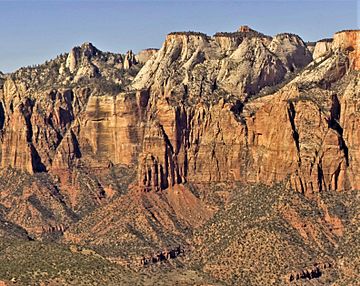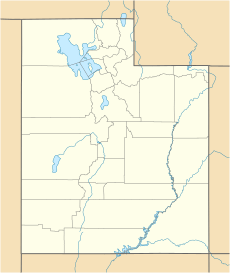Meridian Tower (Zion) facts for kids
Quick facts for kids Meridian Tower |
|
|---|---|

Meridian Tower (flat top, centered) seen from the SSE from the summit of The Watchman
|
|
| Highest point | |
| Elevation | 7,340 ft (2,240 m) |
| Prominence | 180 ft (55 m) |
| Isolation | 0.34 mi (0.55 km) |
| Parent peak | Point 7455 (7,455 ft) |
| Geography | |
| Location | Zion National Park Washington County, Utah United States |
| Parent range | Colorado Plateau |
| Topo map | USGS Springdale West |
| Geology | |
| Age of rock | Jurassic |
| Type of rock | Navajo sandstone |
| Climbing | |
| First ascent | 2016, Stih and Mower |
| Easiest route | class 5.8 climbing |
Meridian Tower is a tall mountain peak located in Zion National Park in southwest Utah, United States. It stands 7,340 feet (about 2,240 meters) high. This amazing tower is made of a type of rock called Navajo Sandstone.
About Meridian Tower
Meridian Tower is part of a group of peaks called the Towers of the Virgin. It's about 2 miles (3.2 km) northwest of Zion National Park's main office. The tower rises an incredible 3,350 feet (1,020 meters) above the bottom of Zion Canyon. The Virgin River flows nearby, carrying water away from the mountain.
Some of its famous neighbors include The West Temple, The Sundial, and The Sentinel. The park's third superintendent, Preston P. Patraw, named this peak. He called it Meridian Tower because its flat top is crossed by the 113th meridian (an imaginary line on Earth). The name was officially accepted in 1934.
First Climb
People didn't climb Meridian Tower until much later. The very first time someone reached the top was in March 2016. This historic climb was made by two adventurers, Dan Stih and Matt Mower.
Climate Around the Tower
The best times to see Meridian Tower are in spring and fall. The area has a Cold semi-arid climate. This means the coldest month usually has an average temperature below 32 °F (0 °C). Also, at least half of the yearly rain falls during spring and summer. This desert climate gets less than 10 inches (250 mm) of rain each year. Snowfall in winter is usually light.
 | Calvin Brent |
 | Walter T. Bailey |
 | Martha Cassell Thompson |
 | Alberta Jeannette Cassell |



